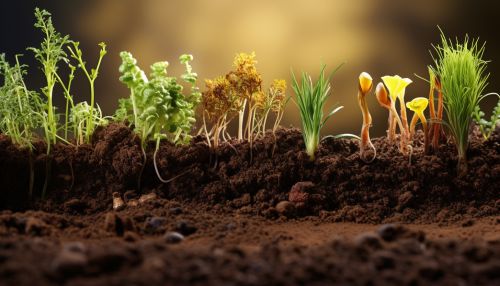The Role of Microbes in the Nitrogen Cycle and Fertilization
Introduction
The nitrogen cycle is a crucial part of the Earth's ecosystem, involving the transformation of nitrogen from its inert atmospheric form into compounds that can be used by living organisms. A significant part of this process is facilitated by various microbes, which play a vital role in the nitrogen cycle and fertilization of soils. This article will delve into the specifics of these processes, providing a comprehensive understanding of the role of microbes in the nitrogen cycle and fertilization.
Microbes and the Nitrogen Cycle
Microbes, including bacteria and fungi, are key players in the nitrogen cycle. They facilitate the conversion of nitrogen in the atmosphere into a form that can be used by plants and animals, and then back into its atmospheric form. This process is divided into several stages: nitrogen fixation, nitrification, assimilation, ammonification, and denitrification, each of which involves different types of microbes.
Nitrogen Fixation
Nitrogen fixation is the process by which nitrogen gas (N2) from the atmosphere is converted into ammonia (NH3) by nitrogen-fixing bacteria, such as Rizhobium and Azotobacter. These bacteria are able to convert nitrogen gas into ammonia because they contain the enzyme nitrogenase, which catalyzes the reaction. Nitrogen fixation is a critical first step in making atmospheric nitrogen accessible to other organisms.
Nitrification
Nitrification is the process by which ammonia is converted into nitrite (NO2-) and then into nitrate (NO3-) by nitrifying bacteria. This process is carried out in two steps: first, ammonia is oxidized to nitrite by bacteria such as Nitrosomonas, and then nitrite is oxidized to nitrate by bacteria such as Nitrobacter. Nitrates are a form of nitrogen that can be readily absorbed by plants.
Assimilation
Assimilation is the process by which plants and animals take up nitrogen in the form of nitrate and incorporate it into their own biological molecules, such as proteins and nucleic acids. This is the primary way that nitrogen enters the food chain.
Ammonification
Ammonification, also known as mineralization, is the process by which organic nitrogen in dead organisms and waste products is converted back into ammonia by decomposer microbes, such as certain bacteria and fungi. This process returns nitrogen to the soil in a form that can be used by plants or further processed by other microbes.
Denitrification
Denitrification is the final step in the nitrogen cycle, where nitrate is converted back into nitrogen gas by denitrifying bacteria, such as Pseudomonas and Clostridium. This process returns nitrogen to the atmosphere, completing the cycle.


Microbes and Fertilization
Microbes play a significant role in the fertilization of soils. They are responsible for the decomposition of organic matter, releasing nutrients into the soil that can be used by plants. In addition, certain microbes, known as mycorrhizal fungi, form symbiotic relationships with plant roots, helping them absorb nutrients from the soil.
Decomposition
Decomposition is the process by which organic matter, such as dead plants and animals, is broken down into simpler substances by decomposer microbes. This process releases nutrients, including nitrogen, into the soil, enriching it and making it more fertile.
Mycorrhizal Relationships
Mycorrhizal fungi form symbiotic relationships with plant roots, extending the root system and increasing the plant's ability to absorb nutrients from the soil. These fungi receive sugars from the plant in return, making this a mutually beneficial relationship. Mycorrhizal fungi are particularly important in nutrient-poor soils, where they can significantly improve plant growth and productivity.
Conclusion
Microbes play a crucial role in the nitrogen cycle and the fertilization of soils. They facilitate the conversion of nitrogen from its atmospheric form into a form that can be used by plants and animals, and then back into its atmospheric form. In addition, they contribute to soil fertility by decomposing organic matter and forming symbiotic relationships with plant roots. Understanding these processes is essential for managing soil fertility and promoting sustainable agricultural practices.
